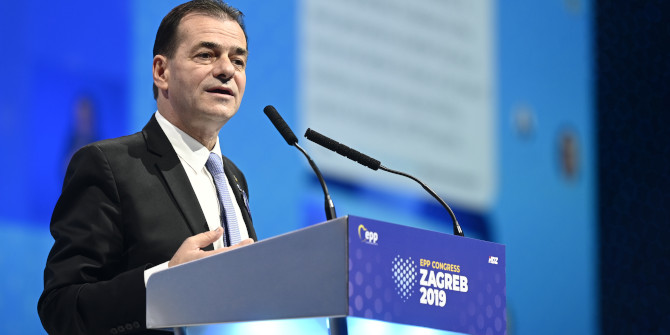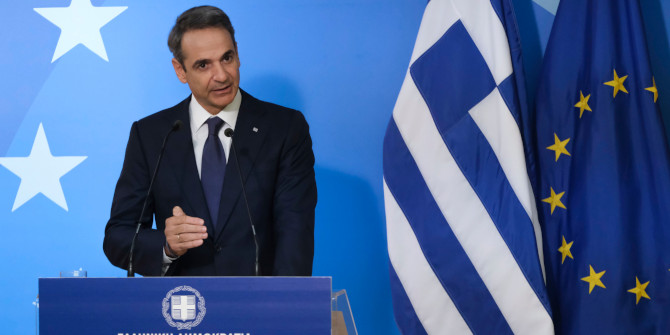Romania will hold legislative elections on 6 December. Sergiu Gherghina previews the vote, writing that while the ruling National Liberal Party is likely to stay in power, the elections will represent a number of firsts for the country.
Romanians will go to the polls this Sunday, the fourth time they have been called to vote in an election in a little over 18 months. This time, it will be legislative elections on the ballot, following presidential and European elections in 2019, and local elections earlier this year. The previous three elections demonstrated a consistent pattern that is unlikely to change in the forthcoming legislative elections. The ruling National Liberal Party (PNL), which currently holds power in a minority government, will continue their term in office, but with the possibility of strengthening their position.
Three novelties for Romanian politics
The 6 December elections will nevertheless bring several novelties to the Romanian political arena. It will be the first time in more than two decades that the Social Democratic Party (PSD) will not be in pole position to win the popular vote. This is underlined by the fact the PNL secured the largest vote share at last year’s European elections, won the 2019 presidential election, and defeated the PSD in the 2020 local elections. Although the social democrats placed second in all three of these contests, the party is facing a battle to maintain this position in the face of strong competition from a recently formed electoral alliance between the Save Romania Union (USR) and the Freedom, Unity and Solidarity Party (PLUS).
The social democrats have lost electoral support on a continuous basis since 2017. Back then, they sought to change Romania’s anti-corruption laws to allow the party’s leader, Liviu Dragnea, to avoid a prison sentence. These actions sparked protests throughout the country and criticism from EU officials. The imprisonment of Dragnea after the 2019 European elections pushed the PSD into uncharted territory. Since 2010, it has consistently had charismatic leaders capable of mobilising followers and voters. The new leader, Marcel Ciolacu, was elected in August 2020 at a Congress postponed by the Covid-19 pandemic. With the legislative elections coming just a few months into his leadership, he will need more time to demonstrate his electoral abilities.
The elections thus promise to be a defining moment for the PNL, with the liberals aiming to win legislative elections on their own for the first time since the party was refounded in 1990. The PNL has been the party with the greatest number of splits and mergers over the last three decades. It was part of the Social Liberal Union, which won a landslide in the 2012 legislative elections. But the leading party in that alliance was its main opponent today, the PSD. The liberals have rarely competed on their own in elections and their best electoral result so far has been around 20%. Current opinion polls place them closer to 30% this time, which would not be sufficient for them to govern alone, but would make them the leading player in a likely coalition with USR-PLUS.
A third novelty of the 2020 elections is that the ruling party will continue in office after the vote. Until now, essentially every election in the post-communist period has brought about a dramatic change in the composition of the government. One partial exception to this rule was in 2012, when the caretaker government appointed half a year before the legislative elections stayed in power via the Social Liberal Union’s landslide victory. This time, the PNL stands to stay in power after a little over a year in government – though it has been a year marked by turmoil.
Minority governments and Covid-19
The PNL took office in November last year after a no-confidence vote in the Romanian parliament ended three years of social democratic governments. Ludovic Orban, the PNL’s leader, was appointed as Prime Minister and formed a minority cabinet. This lasted until February this year, when the new government lost its own vote of no-confidence. The Minister of Public Finance, Florin Cîțu, was nominated by Romania’s President, Klaus Iohannis, to form a new cabinet.
Within a month, things got complicated. The country’s Constitutional Court rejected a Government Emergency Ordinance calling for early legislative elections. The same day, Cîțu resigned just before receiving the vote of confidence in parliament. Two days later, Orban returned to office with a minority government after receiving the support of a parliamentary majority. His second cabinet received broad parliamentary support, mainly due to the outbreak of Covid-19 in Romania that month.

Ludovic Orban, Credit: European People’s Party (CC BY 2.0)
The PNL’s presence in government during the Covid-19 outbreak has had an important impact on the party’s electoral prospects. Several polls indicate a continuous decrease in support for the PNL throughout the pandemic. In spite of this, they won the local elections in September, which were initially scheduled for June.
The liberals were accused by the social democrats of encouraging roughly 100 mayors to leave the PSD and join their ranks just before the elections to boost their electoral support. This practice of recruiting mayors in office, who were originally elected under the banner of another party, has a precedent in Romanian politics, going back to 2014. Back then, it was a PSD Prime Minister, Victor Ponta, who issued a Government Emergency Ordinance that allowed mayors to move from one party to another without losing office.
What else to watch out for
Sunday’s elections will likely confirm the appeal of the USR-PLUS alliance. Formed a few months before the 2016 legislative elections, the USR finished in third place in its first contest, with roughly 9% of the vote. For the 2019 European elections, it joined forces with PLUS, a newly founded party belonging to former technocrat Prime Minister, Dacian Cioloș. They finished third in those elections with 22% of the vote. Opinion polls position the alliance around a similar level for the upcoming election. Most commentators foresee a government coalition between the PNL and the USR-PLUS alliance, particularly given the liberals backed the Cioloș cabinet in 2015.
Two small parties – one belonging to former President Traian Băsescu, and one a splinter group from the social democrats – will also be aiming to gain seats in parliament. The polls place them in the vicinity of the 5% threshold required for parliamentary representation. Even if they are successful, each of these parties will very likely end up in opposition. The splinter group, PRO Romania, is led by Victor Ponta, and has attracted roughly two dozen dissatisfied PSD parliamentarians. Its rhetoric echoes the PSD discourse and it appeals to voters who traditionally back the social democrats. This is one explanation for the latter’s lower support this year compared to previous elections.
Finally, it is worth noting that the diaspora vote may be affected by the pandemic. There are several million Romanians abroad and their vote has been an important factor in recent elections. The social democrats have very little support among the diaspora. For example, in the 2019 European elections, almost 400,000 Romanians voted abroad, with the PSD receiving only around 4% of the vote. Three quarters of the diaspora vote went to the USR-PLUS alliance and the PNL, in this order. In the 2019 presidential elections, almost a million Romanians voted abroad, with the PSD candidate only receiving around 6% of the vote. The rest went to the PNL candidate. The lockdown situation and travel restrictions in many countries may disincentivise citizens abroad from casting their vote this time around.
All these trends indicate a predictable result in Sunday’s elections. The winner is quite certain, there is some competition for second place but without much resting on the outcome, and a couple of minor parties face a fight to get into parliament. The key question is the share of the vote that will be received by the competitors, which will determine the size of the governing coalition and how comfortable they will be in the next parliament.
Note: This article gives the views of the author, not the position of EUROPP – European Politics and Policy or the London School of Economics. Featured image credit: European People’s Party (CC BY 2.0)





How much change in diaspora vote can these sensible propositions stand?
I might recall a few numbers – dispora turnout, mainland margins & suh; you must know them.